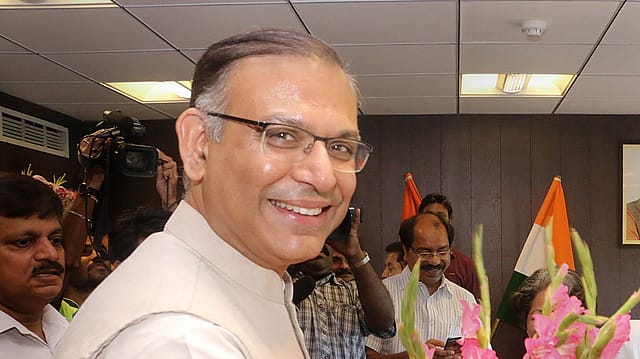Stake in new Air India entity will help pay off liabilities: Jayant Sinha
ADVERTISEMENT

Union minister of state for civil aviation Jayant Sinha has said the government wants to retain a certain quantum of stake in Air India post-disinvestment so that it can have a share in the value that is expected to be created over time by the new owners of the distressed national carrier. The minister did not clarify the quantum of the stake.
“It will also help pay down the huge liabilities that the government will have to absorb because it will be selling the core airline with only a sustainable amount of debt,’’ Sinha told Fortune India in an interview.
The extra debt that is left behind in the Air India books after the sell-off will be put into a special purpose vehicle (SPV), which would otherwise have to be repaid through taxpayers’ money. Over the years, Air India has worked up an unsustainable debt of about Rs 48,877 crore.
Explaining the rationale for the government’s plan to retain a stake, the minister said: “Don’t forget that at the present moment Air India has an unsustainable level of debt now and the way that it is going to happen is that the core airline will only have a sustainable level of debt. So, a significant amount of the debt will be in the SPV that the government is setting up to absorb the unsustainable debt. That is going to devolve onto tax payers.”
January 2026
Netflix, which has been in India for a decade, has successfully struck a balance between high-class premium content and pricing that attracts a range of customers. Find out how the U.S. streaming giant evolved in India, plus an exclusive interview with CEO Ted Sarandos. Also read about the Best Investments for 2026, and how rising growth and easing inflation will come in handy for finance minister Nirmala Sitharaman as she prepares Budget 2026.
“So if we have to pay down some of that debt then it is good that some people unlock the value and the government can use that value to pay down the debt,” Sinha explained.
The government remains committed to maintaining Air India’s “domestic carrier status” on the lines of Qantas and British Airways, thereby restricting the foreign airlines’ equity to 49% directly or indirectly, and the government owning some share of the airline.
“The cabinet has already announced that foreign ownership of Air India directly and indirectly will not exceed 49%,” the aviation minister added. “What will be the kind of equity that the government will have in the airline will be decided by AISAM [Air India Specific Alternative Mechanism].”
Last year, the union cabinet finally gave its ‘in-principle’ nod to divest stake in the ailing government-owned Air India after years of dilly-dallying, signifying its willingness to shed majority stake and hand over the management to a private sector player. Whichever entity eventually buys the ailing carrier, the airline pecking order in India is expected to change dramatically as a result. No-frills airline IndiGo and a foreign entity are among those who have reportedly shown interest in buying Air India.
(Additional reporting by Sourav Majumdar and Debabrata Das)
